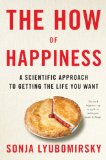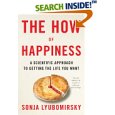“Dr. Happiness” Ed Diener and Professor Sonja Lyubomirsky are two of the leading researchers on happiness. A funny thing happened the day after I wrote my last post, where I introduced Dr. Diener and talked about his Life Satisfaction Scale. I got an email from Dr. Ben Dean (who I’ll talk about in a minute) saying Dr. Diener “is considered to be the world’s leading authority on research on happiness” and inviting me to a conference-call interview of Dr. Diener and Dr. Lyubomirsky that night.
Both Ed Diener and Sonja Lyubomirsky have written popular books about happiness. Sonja’s book has been out for awhile now. I just did a search for “happiness” in the “books” section of Amazon.com, and it came up second. It’s called: The How of Happiness: A Scientific Approach to Getting the Life You Want. It’s a how-to book. In the Foreword, she says “To my knowledge, this is the first how-to-become-happier book authored by someone who has actually conducted research revealing how people can achieve a greater sense of happiness in their lives.”
She’s certainly qualified to talk about happiness: she was awarded a Templeton Positive Psychology Prize in 2002, she’s an associate editor of the Journal of Positive Psychology, and she and Ken Sheldon have a 5-year million-dollar grant from the National Institute of Mental Health to conduct research on the possibility of permanently increasing happiness.
Just looking at the table of contents gives you an idea how much she has to offer:
Part One: How to Attain Real and Lasting Happiness
1. Is It Possible to Become Happier?
2. How Happy Are You and Why?
3. How to Find Happiness Activities That Fit Your Interests, Your Values, and Your Needs
Part Two: Happiness Activities
Foreword to Part Two: Before You Begin
4. Practicing Gratitude and Positive Thinking
5. Investing in Social Connections
6. Managing Stress, Hardship, and Trauma
7. Living in the Present
8. Happiness Activity No.10: Committing to Your Goals
9. Taking Care of Your Body and Your Soul
Part Three: Secrets to Abiding Happiness
10. The Five Hows Behind Sustainable Happiness
The Promise of Abiding Happiness: An Afterword
Postscript: If You Are Depressed
Appendix: Additional Happiness Activities That May Fit
Dr. Lyubomirsky has found that happy people tend to perceive and interpret the world in ways that reinforce their happiness, and unhappy people do the reverse. Happy people respond in a more positive and adaptive way, while unhappy people tend to dwell or “ruminate” on negative or ambiguous events, draining cognitive resources and creating negative consequences.
She and her colleagues are investigating ways that happiness can be reliably and durably increased. They believe it can be done through intentional activities, but that these require “daily and concerted effort and commitment.” They are testing the effectiveness of gratitude exercises, “self-regulatory” and positive thinking about oneself (such as reflecting, writing, and talking about one’s happiest and unhappiest life events, or about one’s goals for the future), and practicing acts of kindness and altruism.

She talked about some of these things in the interview, and deals with how to apply some of them in practical ways in her book.
I want to talk about Ed Diener’s new book too, a bit more about the interview, and about Ben Dean’s work. But I think I’m going to have to break this up into several posts. In the meantime, take a look at Sonja’s book, The How of Happiness: A Scientific Approach to Getting the Life You Want.

Does cultivating gratitude increase happiness? Not very many studies have tackled this question directly, but the evidence so far from psychology research is pretty clear: Yes.
, Sonja Lyubomirsky discusses eight ways gratitude boosts happiness.
![[Circle]](http://www.meaningandhappiness.com/pictures/GoldCircle36i.png)


